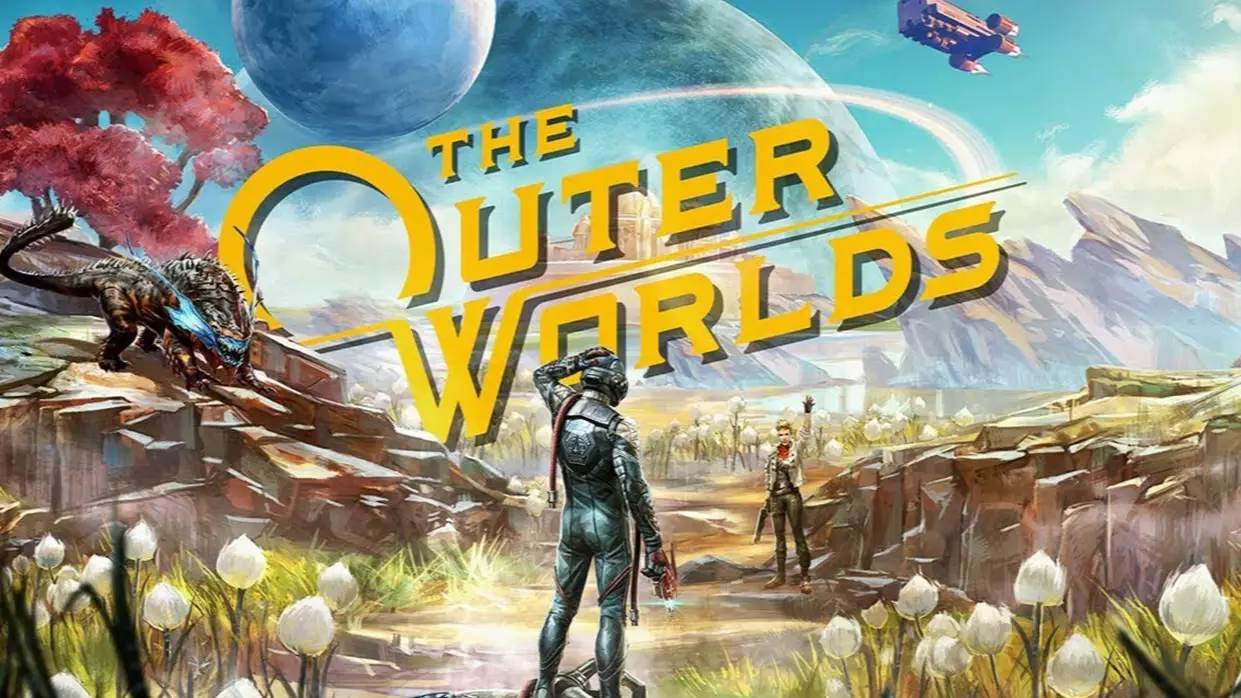
As I pull the power regulator out of the generator running a greenhouse on an alien wasteland, I can't help but think that I've been here before. I had the choice to take the same part out of the generator in a nearby industrial town - in either case forcing the population of one settlement to move to the other. I've not had to make this exact choice before, but across all of the modern Fallout games you need to make choices that help one faction while alienating another. The Outer Worlds isn't Fallout, but it's so like it that there's no point in avoiding the comparison, and even Obsidian proudly made the connection in the game's reveal trailer: "From the original creators of Fallout."
The Outer Worlds is a first-person RPG which has the stylings of a Wild West frontier woven into its take on science fiction. You're given a solar system called Halcyon to explore, dotted with multiple planets and moons, all of them owned and operated by the corporations that colonised the region - with a couple of independent outliers. Those corporations make up a group called The Board, who generally make life hell for the citizens of the Halcyon colony.
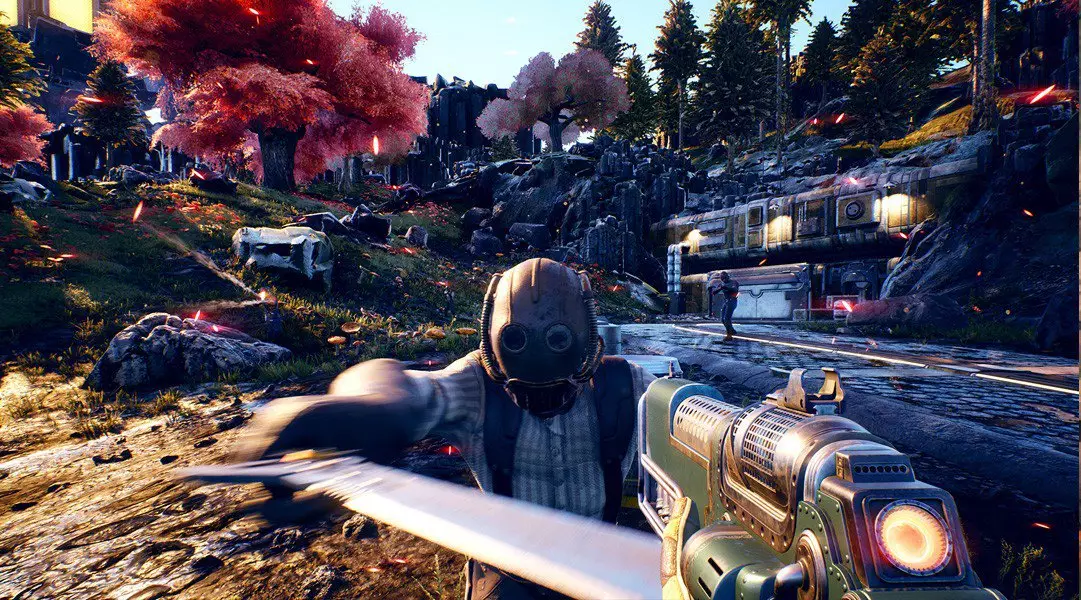
Settlements were created to exploit the resources of the solar system and basically everyone living on a planet's surface is working to profit the corporations that house them. For instance, there's the Saltuna Cannery at Edgewater, where anything vaguely edible is processed into a paste that is allegedly fish - and sometimes flavoured with spearmint to really horrify the taste buds - is the sole reason for the people's existence. They're literally starving themselves to continue production.
Advert
There is still hope for the colony, though. On the outskirts of Halcyon lies a ship stuffed to the gills with scientists, engineers and colonists, all just waiting there in hypersleep. This was the second ship sent to colonise Halcyon, one that arrived decades late after its engines malfunctioned. You are one of those colonists, woken up by a rogue scientist who aims to topple the board and make life on the Halcyon colonies bearable. He's able to wake you up, but you'll need to search the solar system for the resources to wake up the rest of the ship.
After creating your character you're promptly dropped onto Terra 2 on the outskirts of Edgewater, the cannery settlement, and tasked with meeting a guide who will lead you to the people who will find you the resources you need. The plan hits a small hiccup, however, when your escape pod lands on the person you were due to meet, squashing them into a fine paste. Which, on the plus side, really opens up the game for you to stretch your player agency. You can explore the town and the entire region of Edgewater freely, talking to characters, finding quests, and battling outlaws, malfunctioning robots, and oversized alien lizards.
If you've played Fallout before, you won't need any prompts on how to play as it's virtually identical. You can level up your stats on different weapons to increase your combat capabilities; put your skill points into dialogue abilities like persuasion, to open up options in conversation not available to more clumsy-tongued players; or flesh out your hacking, sneaking, and lock-picking skills to give you the means to bypass locked doors and computers. Almost every quest has different ways to complete it, with you either going in all guns blazing, talking people out of a fight altogether, or sneaking past a confrontation to nab whatever item you were sent in search of without being spotted by the enemy at all. It's entertaining, but it's much the same as how we were playing Fallout 3 back in 2008.
Advert
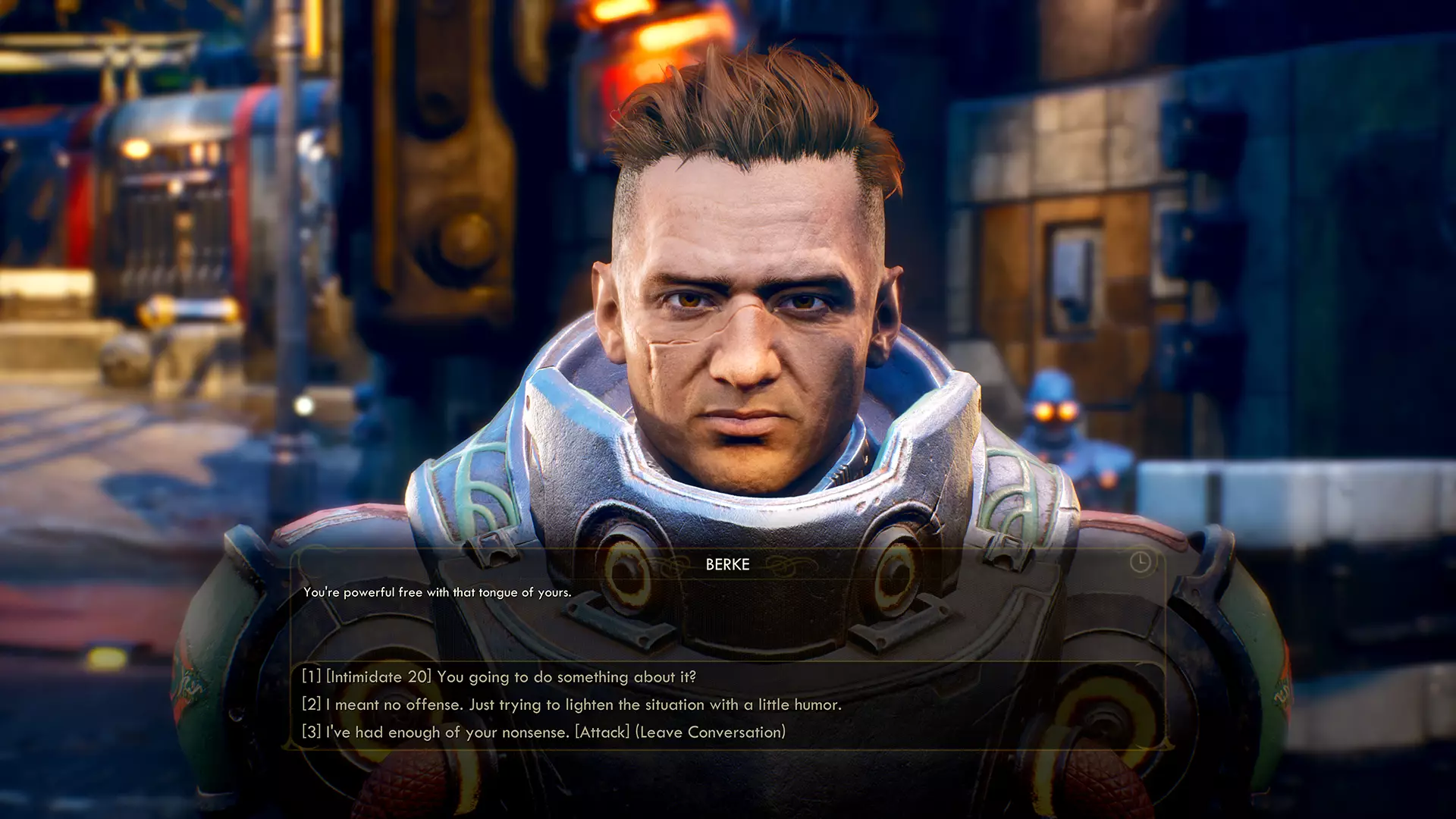
The Outer Worlds does have systems that aim to improve on Fallout. For example, you can be joined on your adventures by two companions at a time, instead of one. As in Fallout, these companions will comment on the world you explore, providing a personal insight on Halcyon, and they've each got a unique combat ability. An engineer called Parvati Holcomb, who you recruit at Edgewater, can smash enemies with her hammer, killing them outright or leaving them temporarily stunned, making them easy to pick off. As you level up you can also assign these companions perks, that make them more competent - increasing their armour, damage, and health.
Every two levels, you can pick a new perk to augment your character - but none of these are wildly exciting, and often simply reduce a mild pain point in play. For instance, increasing your walk speed by 25%, reducing the carry weight of consumable items, or increasing the damage you do with headshots. They're useful buffs but they don't wildly change the game. So while you can argue they are another way to make your character unique, they aren't something that will make my character or adventures in Halcyon radically different from yours if we pick different perks.
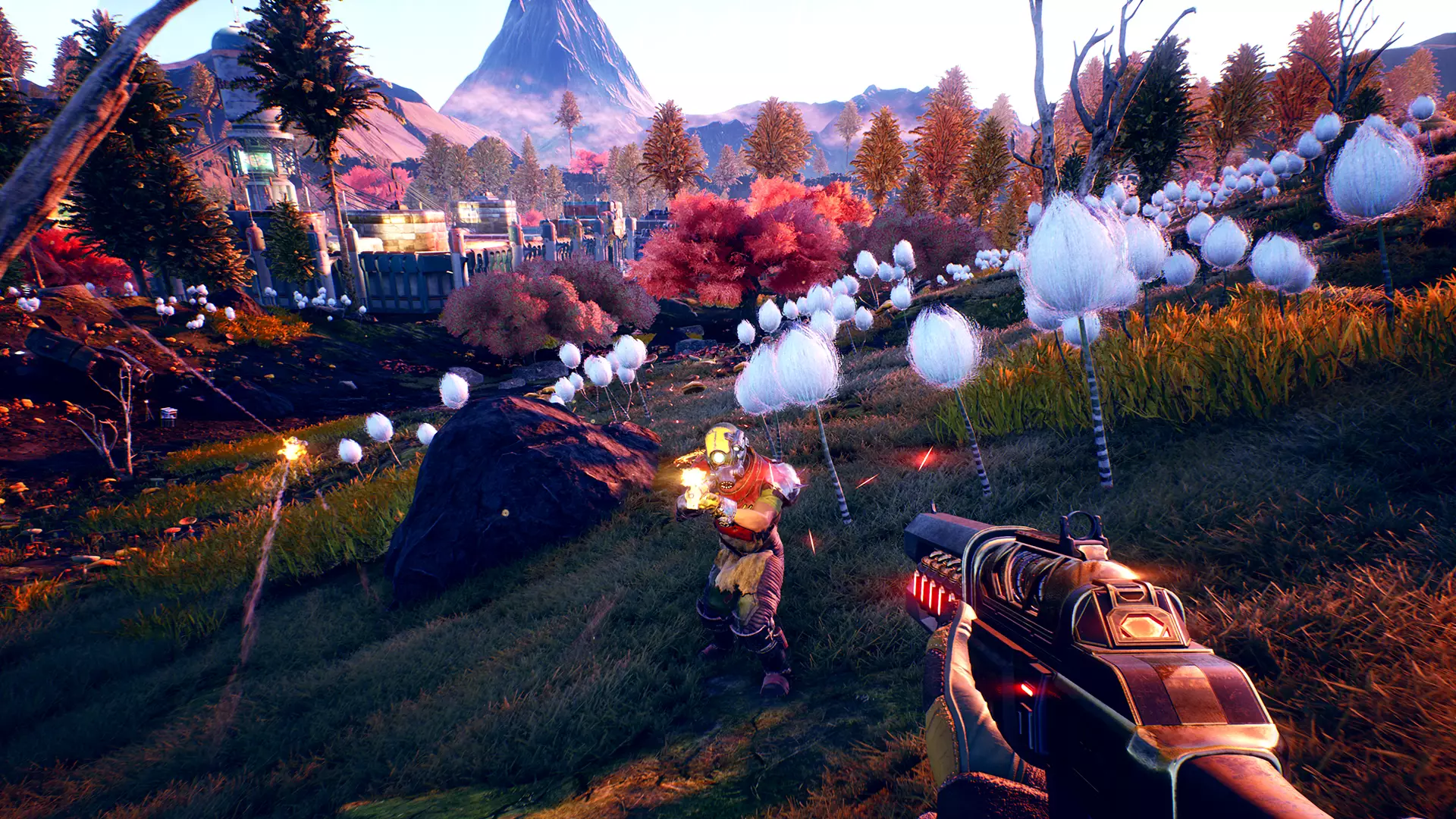
Advert
Tied to the perk system are flaws, an optional penalty you can receive after being damaged a lot in combat by a particular kind of enemy. For example, if you have a few tough fights against robots you're given the choice of developing Robophobia. If you accept the flaw then every time you face robots in the future your dexterity, perception and temperament will all be temporarily debuffed. However, in exchange for developing the flaw you're given an extra perk - which, again, would be a more interesting decision if the perks themselves were more exciting. I've been accepting every flaw I develop, simply to increase my character's movement speed and carry weight to make being over-encumbered less of a chore. As roleplaying goes, it's a strange story to tell of myself that I'm scared of every enemy I come across, but that's why I developed such strong thighs.
While Halcyon itself is a whole new game world to explore, with each planet having a unique colour palette and terrain, elements of the planets become repetitive quickly. All the worlds I've visited have human outlaws, deranged robots, and the same selection of alien wildlife to fight. The architecture, too, follows a similar style of prefabricated buildings, with reused interiors and exteriors. While this might all be explained narratively - these settlements were made by the same corporations and within a similar time period, the robots that have gone haywire were in use in all the colonies, and the creatures were transported between colonies for food and experimentation - it's dull in practice to go from world to world and find so much the same.
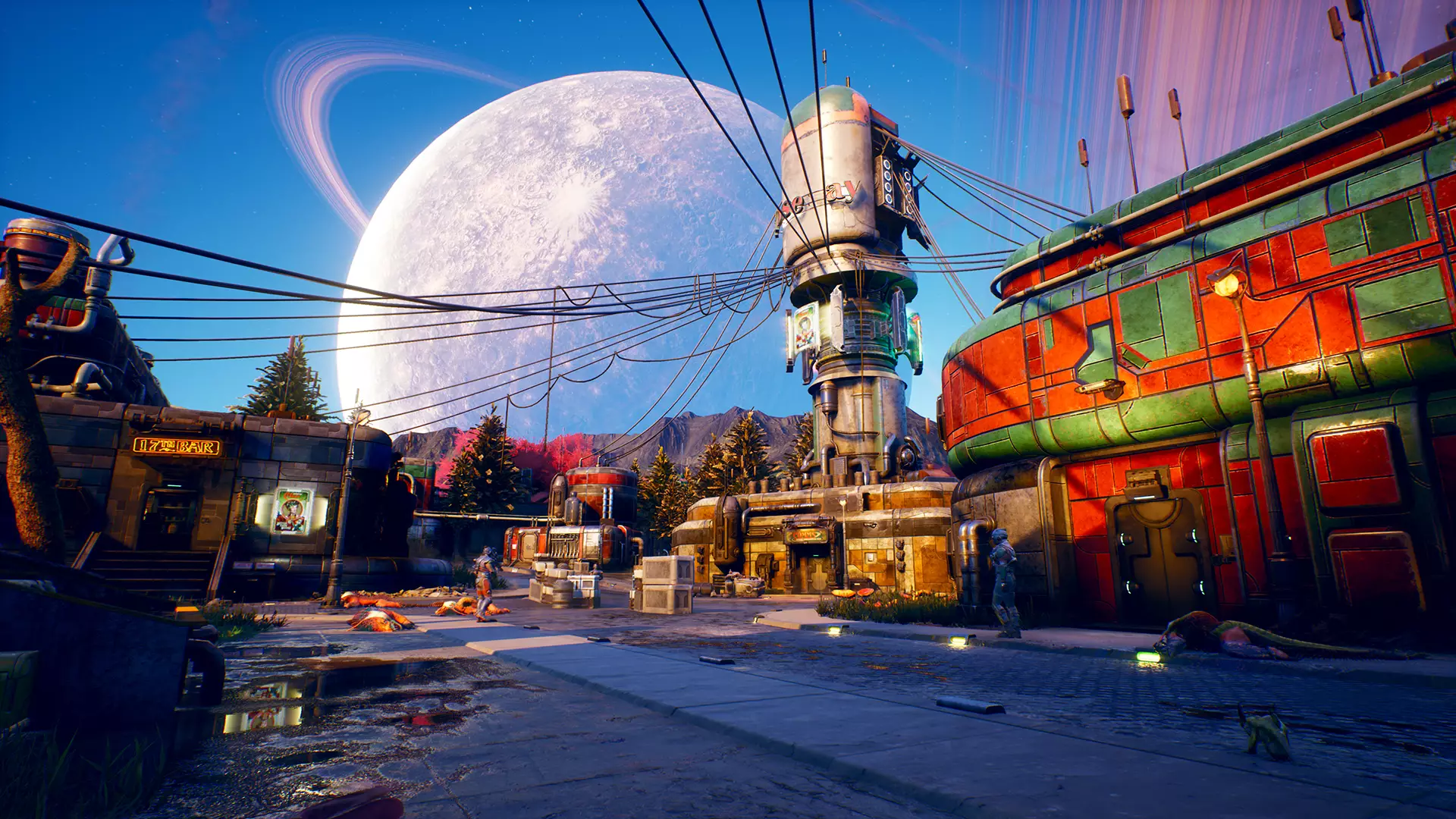
The longer I played The Outer Worlds, the more I couldn't shake the feeling that as competently made the game clearly is, it's just not all that exciting. It's a Fallout game in all but name, but one that doesn't push the genre or its trademark elements forward. The quest design is the same, the major moral decisions are the same, and enemies you face - haywire robots, giant lizards and bugs, and outlaws - are all so familiar. Obsidian has a reputation for taking other studios' series and making the best version of those games. Fallout: New Vegas and Knights of the Old Republic 2 are both seen as classics that subvert expectations of the genre and their series. But in The Outer Worlds, a world made completely by Obsidian, it all feels so generic. I've enjoyed what I've played, but I've never been surprised by it.
Advert
Back in August I brought this up with project director Brian Heins, asking him what the team was aiming for with The Outer Worlds, and he explained: "We're creating this entirely new sci-fi IP, this whole new look and style, the feel of the game, the tone of the writing, that dark sense of humour. And this is the first time working with the Unreal 4 engine. So creating all the game code for this style of game in that engine, how to integrate all of our other tools at Obsidian to create that foundation and make a really solid, polished fun experience. And that gives us a great foundation to grow on for future projects."
I can see that while I play, The Outer Worlds is everything needed and expected from a first-person RPG, one that can then be expanded on in the future, with innovative systems, original worlds, and unexpected characters - they now have a hub to fit into. The problem for players is: why play this game instead of waiting for the one that fully escapes the shadow of Fallout?
7/10
Featured Image Credit: Obsidian EntertainmentTopics: Obsidian Entertainment, Review